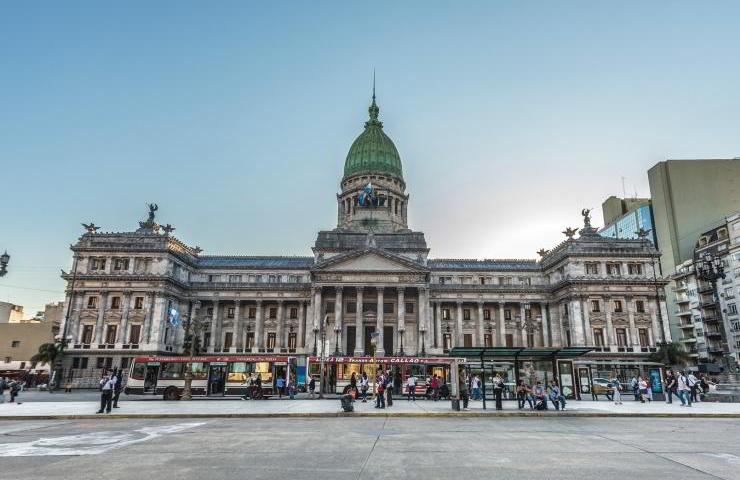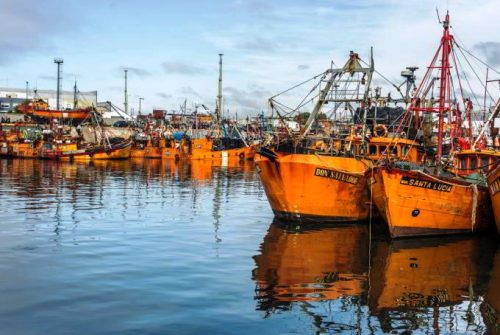Polarised Politics.

Argentina is a federal republic with a presidential system where the President of the Nation exercises executive power and is simultaneously head of state and government.
The legislative power is bicameral, with a Senate and a Chamber of Deputies, while the judiciary is formally independent, although in recent decades it has often shown signs of structural weakness and permeability to political pressure.
At the territorial level, the country is divided into 23 autonomous provinces plus the Autonomous City of Buenos Aires, which serves as the federal capital. This organisation gives the provinces a certain political and administrative autonomy, but also contributes to the fragmentation of power, which sometimes makes national coordination difficult, especially in times of crisis.

Political campaign in the city centre of Salta. The Argentine political landscape is historically polarised, with alternating cycles between reformist and populist projects. 123rf
The Argentine political landscape is historically polarised, with alternating cycles between reformist and populist projects, often embodied by the Peronist movement, and governments more oriented towards economic liberalism. This internal opposition has never been completely autonomous from the global geopolitical context. In particular, during the Cold War and in the following decades, the United States exerted a direct and indirect influence on the Argentine political system, traditionally supporting the forces closest to economic models open to the free market and pro-Western policies. The opposition between more sovereigntist or anti-imperialist governments – often wary of Washington – and pro-American administrations was reflected in economic policy choices, international alignments and even in the management of internal security.

Néstor Kirchner and his wife, Cristina Kirchner, just after her presidency began, 10 December 2007. Photo: Presidencia de la Nación Argentina
Even in recent years, ideological preferences with respect to the United States have continued to represent a factor of division. Even if the Kirchnerist governments – the Peronist current headed by Cristina Fernández de Kirchner, wife of the Néstor Kirchner – have often maintained a critical position towards the International Monetary Fund and the role of the United States in Latin America, the Macri administration, first of all, and then that of Javier Milei, marked a return to an openly Atlanticist and pro-Washington vision.
In recent decades, Kirchnerism has dominated the national political scene, with a model characterised by strong state intervention. After the parenthesis of the government of Mauricio Macri (2015-2019), marked by a more liberal and pro-Western orientation, Argentina returned to a Peronist leadership with the presidency of Alberto Fernández, although characterised by an unstable balance between the president and the powerful Vice-President Cristina Fernández.
The 2023 elections represented a radical turning point with the rise of Javier Milei, a libertarian outsider who catalysed popular discontent towards the traditional system, leveraging an anti-statist, anti-system and strongly liberal message. Milei inherited a country deeply marked by an economic crisis, distrust in institutions and strong political fragmentation. His first moves in domestic politics focused on the drastic reduction of public spending, the deregulation of the market and the promotion of institutional reforms aimed at streamlining the State.

President of Argentina, Javier Milei. He inherited a country deeply marked by an economic crisis, distrust in institutions and strong political fragmentation. CC BY-SA 3.0/Gage Skidmore
However, his proposals have encountered numerous obstacles both in Parliament, where he does not have a solid majority, and on the streets, where unions, social movements and parts of civil society have expressed strong opposition. Even in foreign policy, the change of direction has been clear. Argentina has, in fact, adopted an orientation closer to the United States and Israel, reducing the enthusiasm of previous administrations for relations with China and Russia, while maintaining a pragmatic line in practice.
In this scenario, one of the most controversial issues is that of illegal fishing in Argentine waters, particularly in the exclusive economic zone of the South Atlantic. Squid fishing – a species of high commercial value and a key resource for the food industry – is the subject of massive exploitation by foreign fleets, with China at the forefront. Every year, hundreds of fishing boats, many of which fly the Chinese flag, operate near Argentine territorial waters, often illegally penetrating the exclusive economic zone, taking advantage of the country’s poor naval surveillance capacity. The ships use sophisticated technology, operate mostly at night and in remote areas, making any intervention by the Naval Prefecture or the Argentine Navy difficult.
The phenomenon has reached such proportions that it is not only an environmental and economic issue, but also a problem of national security and territorial sovereignty.
China, the main protagonist of this activity, has progressively expanded its presence in the South Atlantic, while strengthening diplomatic and economic ties with Argentina through infrastructure investments, financing and energy partnerships. This double dimension – economic cooperation and indiscriminate exploitation of marine resources – puts Buenos Aires in an ambiguous position: on the one hand, it needs Chinese financial support in a context of strong economic vulnerability; on the other, it suffers the environmental and employment consequences of illegal fishing, which severely affects local coastal communities and damages the national fish stock.

Typical orange fishing boats in the port of Mar del Plata, Buenos Aires province. To protect maritime territory and natural resources. 123rf
Over the past few years, several governments have announced plans to strengthen control of the waters and punish violations. However, the tools available to Argentina remain limited. The Navy has few resources, often obsolete, and international regulations make it difficult to intervene decisively without triggering diplomatic friction. Some seizures and pursuits of Chinese ships, even culminating in episodes of sinking, have caused a media outcry, but have not been enough to discourage the phenomenon. Furthermore, the lack of coordination between the bodies responsible for control and the chronic scarcity of public resources undermine the effectiveness of maritime policies.
At the political level, Chinese illegal fishing represents an emblematic node of the broader tension between the defence of sovereignty and economic dependence on global actors. The internal debate reflects this ambivalence. Thus, while some forces, especially nationalist or environmentalist ones, call for the strengthening of maritime control and the revision of bilateral agreements, others, more pragmatically, push for a diplomatic management of the issue, avoiding direct confrontation with a strategic commercial partner such as Beijing. In any case, the issue remains open and delicate, and is one of the most complex challenges that the Argentine government will have to face in the near future, especially if it wants to preserve the integrity of its maritime territory and its natural resources. (Open Photo:The National Congress. 123rf)
(F.R.)



